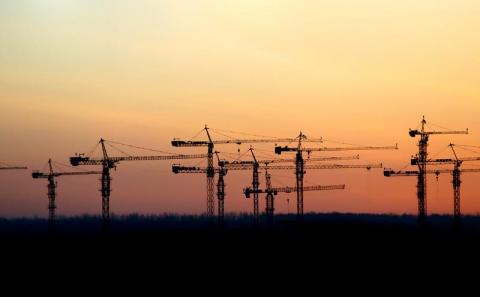Sun sets on China's beleaguered property sector

Beijing's desperate efforts to cool the country's enormous property bubble may have come too little, too late; a worrying sign for the global economy. By Joe Galvin.
Imagine, if you will, a country where a tenth of GDP comes directly from real estate investments. A country where approximately 60% of GDP is funded by real estate and construction related activities and house prices have become so inflated that purchasing even a modest dwelling is beyond the reach of most of the middle and working classes. A country where the property bubble has been inflated beyond the administration’s control, and dramatic new measures to cool the property sector may have come too late.
(Pictured: Cranes dominating the Shanghai skyline)
So far, so familiar. The above paragraph could easily be retrospectively applied to Ireland in 2007, where the boom was drawing to a close and the property bubble was about to pop. However, China is now experiencing the very same thing albeit on an enormous scale.
The warning signs regarding China’s property bubble came as early as this month last year. Cao Jianhai, a professor at the Chinese Academy of Social Sciences, said at the time: “Prices may not fall in the near term but I expect a collapse starting next year, followed by many years of stagnation."
His contention was supported recently by prominent figures such as hedge-fund manager James Chanos, who said this month that China’s economy was on a “treadmill to hell”, and Shanghai economist Andy Xie, who was quoted last month as saying China’s property sector is simply “a massive bubble”.
And bubbles, inevitably, burst. For many observers, the question has become “when” and not “if”. China’s rate of economic growth is still enormous, standing at 11.9% in March. It has become clear, however, that this is simply not sustainable and an increasingly desperate Beijing have accepted that this problem needs to be tackled.
Last week, the administration took the dramatic step of telling banks to stop all lending on third home purchases. Local officials were told it would be their responsibility to keep prices stable; a thinly veiled threat from Beijing, who have been known to arrest officials for failing to live up to their responsibilities.
In 2008, the former mayor of Shanghai, Chen Liangyu, was imprisoned for 18 years for alleged corruption; however, it is largely believed he received this punishment for defying Beijing when they attempted to cool a previous property bubble in 2006. After all, corruption among party officials is endemic and often ignored by party leaders.
Should the Chinese bubble burst, the global consequences could be dramatic. Charles Hughes Smith of Daily Finance said in January: "If housing turns down in China, China's growth could slow or even decline. And since the entire world is looking to China to lead global growth, then that could spell major trouble for the 'global economy is recovering' story."
However, it is difficult to foresee exactly what the global implications would be should the Chinese bubble burst; much of the investment comes from within China itself, and the lending banks are mostly state-owned. This could stave off serious damage to the world economy, but a Chinese crash would undoubtedly cause some problems globally.
As the situation winds to a conclusion, it is certain that Western leaders will be keeping a close eye on China, and praying the country doesn’t suffer the same dramatic fate as Ireland did last year.
